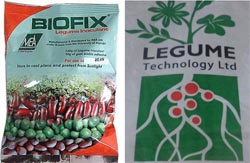|
Inoculant products BIOFIX (from MEA Ltd - Kenya) and LEGUMEFiX (from Legume Technology Ltd - UK) are now registered in Tanzania as fertilizer supplements. This means that the two products can now be directly imported into Tanzania. Registration of these products follows efforts by the COMPRO-II project, which has collaborated with Tanzania Fertilizer Regulatory Authority (TFRA), N2Africa, and other stakeholders to develop registration guidelines for bio-fertilizers including rhizobium inoculants. The implementation of those guidelines was effective in October 2014. Together with the guidelines, standard procedures and laboratory methods for quality control of rhizobia inoculants are available. The soil microbiology laboratory at Sokoine University of Agriculture has been chosen for quality control on behalf of TFRA. COMPRO is investing in the lab to ensure the quality control of inoculants and for further research into beneficial microbiology products. |
Packets of BIOFIX and LEGUMEFiX inoculants |
The BIOFIX and LEGUMEFiX inoculants have been proven profitable to soyabean producers through extensive field trials carried out by TFRA; Agricultural Research Institutions Uyole, Ilonga, Mlingano; and various projects including N2Africa, Soya ni Pesa by CRS and various projects funded by AGRA. In Tanzania, the BIOFIX inoculant will be marketed and distributed by MEA Ltd, while LEGUMEFiX will be marketed and distributed by Export Trading Group (ETG). During the commercialization chain, the products will always have to comply with the labeling requirements prescribed in the registration guidelines for bio-fertilizers.
As the distribution of the product is important, MEA and ETG are now working on mechanisms to assure that smallholder farmers can access these inoculant products. On the other hand, COMPRO and N2Africa continue to sensitize farmers on the use of rhizobium inoculants and to demonstrate its useful application. They do this in partnership with other initiatives including African Fertilizer Agribusiness Partnership (AFAP), Farm Radio International (FRI) and the Legume Alliance initiative by CABI-Africa Soil Health Consortium. The objective is to increase the demand of inoculants in order to grantee the markets for sustainable supply.
Freddy Baijukya and Cargele Masso

